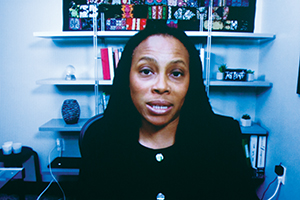By LISA EISENHAUER
When it comes to developing best practices for ensuring equitable access to COVID-19 vaccines, the Catholic health ministry is at the forefront, said Dr. Marcella Nunez-Smith, the chair of the nation's COVID-19 Health Equity Task Force and senior adviser to the White House COVID-19 Response Team.

Dr. Marcella Nunez-Smith
In a keynote session June 14 at the 2021 virtual Catholic Health Assembly, Nunez-Smith applauded outreach efforts including pop-up vaccine clinics set up by Catholic health care providers in medically underserved neighborhoods and partnerships with community groups to reach those without easy access to inoculations.
"You're experts already and I'm grateful for that, but continue to share what's working across all of your networks," she urged during a question-and-answer session with Sr. Mary Haddad, RSM, CHA's president and chief executive officer.
Nunez-Smith, who is also associate dean and director at Yale School of Medicine, said meeting President Joe Biden's pledge to get at least the first round of vaccinations to 70% of Americans 18 and older by the Fourth of July is no simple feat.
The administration has had to confront structural barriers including a lack of transportation and child care, disinformation campaigns that have led to skepticism about the safety and effectiveness of the shots, and fears that those who get vaccinations will be billed if they lack insurance or deported if they lack legal immigration status.
Nevertheless, Nunez-Smith said, about 63% of the adult population had gotten at least one shot and more than a dozen states have reached the 70% goal by mid-June. "But no one is doing a victory lap yet because we know there's more work to do," she said.
In addition to an education campaign about the vaccines, the administration is working with corporations and nonprofit groups to promote access, Nunez-Smith said. For example, it is giving tax breaks to companies that allow time off so workers can get shots and encouraging and publicizing offers of free child care from day care providers such as Bright Horizons and the YMCA.
"The reasons people have a hard time connecting with vaccinations range and so it has to be a very individualized, personalized approach" to overcoming barriers to vaccination, she said.
One clear finding from polling, Nunez-Smith said, is that across demographics people look to their health care providers as trusted sources about the vaccines. Given that, she said, it is important that health care workers share their personal vaccination stories on whatever platforms they have available.
To Sr. Mary's question of what more the Catholic health care ministry can do to encourage vaccination, Nunez-Smith urged continuing "hyper-local" efforts such as going door to door to offer shots and partnering with grassroots groups to figure out when and where to set up clinics.
"We need health care providers to be able to say: 'We're going to come, we're going to bring the vaccine, we're going to bring the vaccinators and be able to stand up a pop-up vaccination event where you are,'" she said.
Sr. Mary said she is hopeful that the ministry's grassroots efforts will help "develop a pattern of engagement that will carry us into the future in terms of how we continue to provide care for our communities."
Nunez-Smith said that goal is in line with those of the Biden administration, whose mission is about "keeping people well." She added that while the pandemic has shined a spotlight on inequities, the nation's response has shown "it is within our power and purview to really make a difference now and for generations to come."
"I think that is our work heading now into the fall and into the future," she said.